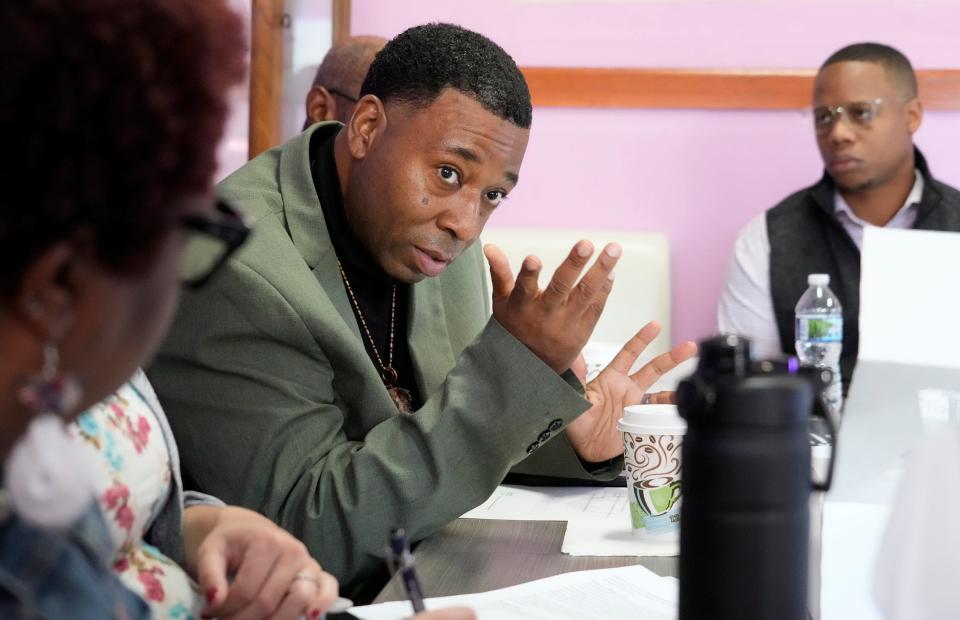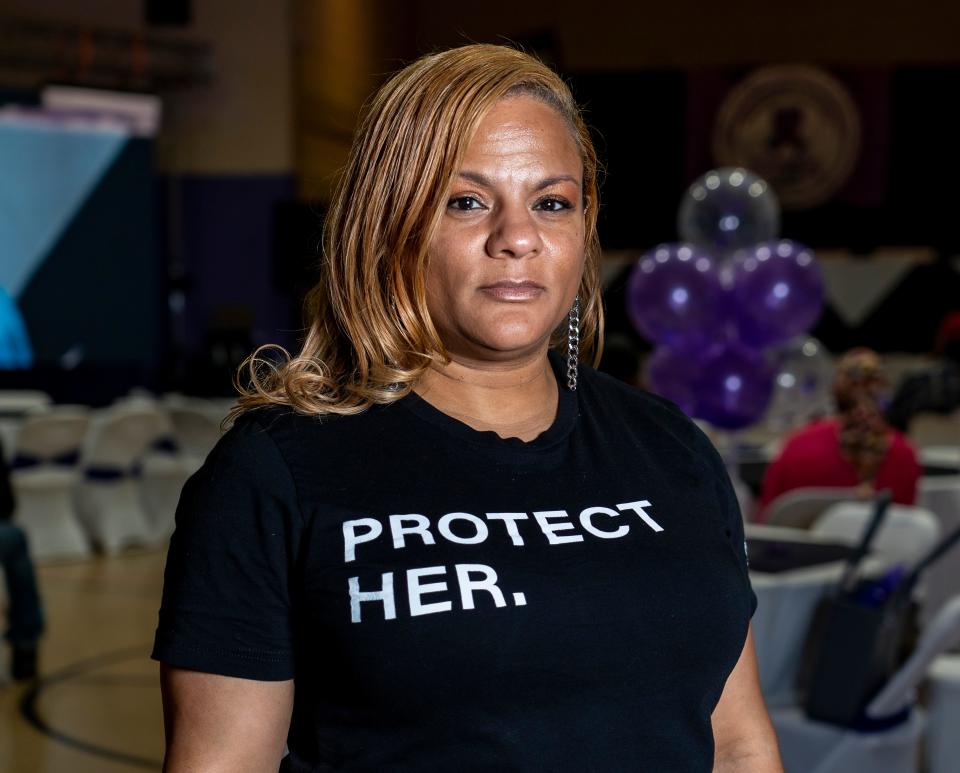Fatal domestic violence is on the rise. Here's what's being done about it in Milwaukee.
Domestic violence is taking a deadly toll in Milwaukee County and across the state.
But there are dedicated advocates, survivors and other partners working to keep victims safe and interrupt the cycle of violence.
We Are Here MKE, a collective of seven culturally specific organizations, has raised awareness of its services for the past three years. Sojourner Family Peace Center expanded programming for children and teens. The Milwaukee County Domestic Violence High Risk Team, a homicide prevention unit, is reviewing more cases than ever before.
Still, there’s fear about sustaining that progress statewide. Wisconsin is expected to see a 70% drop in federal Victims of Crime Act funding that gets funneled to agencies that serve domestic violence victims and others.
The money helps keep shelters open, hotlines staffed and advocates on staffs across the state, not just Milwaukee County. Advocates are pushing state lawmakers to use some of the budget surplus to fill the gap.
Here are nine initiatives underway to address domestic violence.
Saving Ourselves (SOS) campaign highlights resources for Black men

The Asha Project in Milwaukee has offered trauma-informed services tailored to African-American women and men involved in domestic violence for nearly three decades.
This spring, Asha unveiled a six-week social media campaign called Saving Ourselves (SOS) targeting Black men ages 18 to 47 with affirming messages about the strength of Black love and working through trauma. The goal was to boost voluntary participation in Asha’s men’s groups. Most existing participants were referred or ordered to attend through the court system.

The campaign included organic posts and sponsored ads on Facebook and Instagram designed by CMRignite. The work was informed by focus groups of men conducted by an academic researcher. The Greater Milwaukee Foundation provided $50,000 for the project.
The campaign had a higher click-through rate than the industry average and 32 men contacted Asha as a result, a response that includes other programs who saw the ads and made referrals because of it, said Antonia Drew Norton, Asha’s founder.
Asha is seeking more private funding to expand the campaign with video testimonials and adding staff to facilitate more men’s groups.
“They don’t watch the six o’clock news,” Norton said of the men Asha is trying to reach. “They get their news on social media platforms, so that’s where that messaging is so important.”
The Asha Project can be reached at (414) 252-0075.
Promise Keepers outreach team specializes in domestic violence

This year, Milwaukee launched 13 teams of Promise Keepers in select neighborhoods.
These teams are based out of the city’s Office of Community Wellness and Safety, formerly the Office of Violence Prevention. Workers canvass neighborhoods door-to-door regularly, offering residents information on where to find food, housing assistance and other resources to meet their needs.
They came across domestic violence so often that one of the teams is specialized in addressing those conflicts, said Karin Tyler, the office’s operations manager.
Workers were trained to separate the parties and diffuse the situation. They also made referrals to The Asha Project, she said.
“We have to help people that would never even consider coming to an organization or to the police department,” Tyler said.
The Office of Community Wellness and Safety can be reached at (414) 286-5597.
Sojourner Family Peace Center restarts children’s support groups post-pandemic
After a pause during the pandemic, Sojourner Family Peace Center in Milwaukee resumed its support groups for child witnesses to domestic violence.
The 12-week program uses an age-appropriate curriculum for all children, from babies and toddlers to teens. The program includes a family meal and activity.
Sojourner received a federal grant to support this programming and now offers four sessions annually instead of two, said Erin Schubert, Sojourner’s director of outcomes and evaluations.
Surveys at the beginning and end of the sessions have found youth behavior problems decrease and caregivers’ well-being increases.
The grant also allowed for a new 10-week group to teach teens healthy relationship skills and prevent them from getting in abusive or unhealthy relationships as they start dating.
Sojourner Family Peace Center's main switchboard can be reached at (414) 276-1911. The center also has a 24-hour crisis hotline at (414) 933-2722 and an emergency textline at (414) 877-8100.
More staff and funding has gone into the Milwaukee County Domestic Violence High Risk Team
The Milwaukee County Domestic Violence High Risk Team received a $1 million grant from the state and more police officers dedicated to it in 2023.
The team works to prevent domestic violence homicides by trying to hold offenders accountable and protect victims. It’s a collaboration among Sojourner Family Peace Center, Milwaukee and suburban police agencies, prosecutors, the Department of Corrections, the Alma Center and other service providers.
Victims are screened in based on a weighted score from the Lethality Assessment Protocol, a questionnaire used by all 14 law enforcement agencies in the county. The assessment asks victims about strangulation, past threats to kill a victim, access to a gun and other risk factors.
From 2017 through 2022, the team took on more than 4,100 cases and prevented an offender from killing the victim in all but one case.
New way to respond to domestic violence underway in Police District 4
A new team that includes a police officer, prosecutor, forensic nurse and domestic violence victim advocate are responding to domestic abuse calls in Police District 4 on the city's northwest side.
The pilot project began in August, and the team responds to calls one day per week. The goal is for domestic violence victims to access services quickly.
For example, a forensic nurse can swab a victim's neck for DNA evidence to help prove strangulation occurred after a victim reports it. Strangulation is a leading indicator of potentially lethal domestic violence and can result in brain injury, but it does not always leave bruising or other external marks.
More: Bruises can be hard to see on dark skin tones. How technology is illuminating injuries.
The effort is a partnership among the Milwaukee Police Department, the Milwaukee County District Attorney's Office, Sojourner Family Peace Center and Aurora Health Care. The project originally was slated for District 2, on the city's near south side, but was changed to District 4, which historically has high levels of calls related to domestic violence.
Milwaukee police have ongoing training on how to respond to domestic violence
The Milwaukee Police Department’s fall in-service training, which is required for all officers, includes a section on domestic violence.
Part of the training is understanding victims’ perspectives, said Captain Erin Mejia, who leads the Sensitive Crimes Division.
“Victims can react differently,” she said. “They can be emotional, they can be angry, they can appear almost combative, they can just act kind of like nothing is going on.”
Officers are trained that a victim’s demeanor should not be used to make judgments on the severity of what happened or a victim’s willingness to participate in an investigation, she said.
Changes in Milwaukee police procedure to connect victims to advocacy services
The Milwaukee Police Department already required all officers responding to a domestic violence incident that screens in as high-risk to call a hotline staffed by trained advocates.
But under the victim-rights statute known as Marsy's Law, approved by voters in 2020, the department could not give referrals to local advocacy groups if a victim declined to have police share their information with an advocate on the hotline.
This year, the department began having trained officers call the victim back a day or two later to better explain what the advocacy services can provide and offer to connect them again. The change came, in part, after a Milwaukee Journal Sentinel investigation into a fatal domestic violence case earlier this year.
So far, about half of those high-risk victims who originally declined the hotline do end up accepting the offer when contacted a second time, said Mejia, the Sensitive Crimes captain.
Police offering materials for culturally specific advocacy groups
The Milwaukee Police Department also has expanded the agencies in its referral list for domestic violence victims.
Now included is We Are Here MKE, a collective of seven organizations serving victims of domestic abuse and sexual violence from Black, Latino, Asian, Indigenous, Muslim and LGBTQ communities.
We Are Here MKE can be found online at weareheremke.org.
More: 'They know me:' How domestic violence survivors find support in their language, culture
Statewide fatality review legislation is pending
A bipartisan proposal is pending at the Wisconsin statehouse to standardize fatality review boards, which bring together experts to study specific types of deaths and try to prevent them in the future.
The proposal, known as Assembly Bill 188, is expected to include domestic violence deaths. Wisconsin is one of five states in the country without domestic violence fatality review legislation.
The board members go through records from the various agencies and piece together a timeline of what led up to a person's death. They try to identify gaps in systems or services and then propose policy solutions to fix them.
Make your voice heard. Find and contact your representatives.

Need more help with crime and safety questions? The Milwaukee Resource Guide is here to help. Have something you want answered? Submit a question.
Ashley Luthern can be reached at [email protected]. She reported this story while participating in the USC Annenberg Center for Health Journalism’s 2023 Domestic Violence Impact Fund.
This article originally appeared on Milwaukee Journal Sentinel: 9 Milwaukee domestic violence prevention efforts to know about
